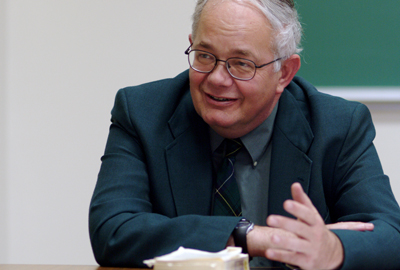 The Triune God
The Triune God
by William Placher ’70
"When those we most love come to die, or in the dementia of old age are no longer able to understand what we may most want to say to them, we realize how much there was in our hearts that we never shared with them."
An excerpt:
For the theology of the Trinity, human persons do not finally define "personhood," with the divine persons a vaguely analogous case. Rather, it is the divine three that manifest what personhood truly is.
…We human persons are always failing to be personal. As persons, we are shaped by our relations with other persons. Yet we always deliberately raise barriers or cannot figure out how to overcome the barriers we confront. When those we most love come to die, or in the dementia of old age are no longer able to understand what we may most want to say to them, we realize how much there was in our hearts that we never shared with them. When we best articulate our ideas, we cannot escape the feeling that there was something there we never quite captured. When we most rejoice in sharing with someone different than ourselves, difference nevertheless scares us.
The doctrine of the Trinity, however, proclaims that true personhood, however impossible its character may be for us to imagine, involves acknowledging real difference in a way that causes not fear but joy.
The Trinity offers not only a model of relatedness but also a model of equality. The world, this doctrine tells us, is not a pyramid with a single Lord at the top. One can never go so high as to transcend equality and mutual sharing, and they are thus built into the structure of all that is. In Jurgen Moltmann’s words, "It is only when the doctrine of the Trinity vanquishes the monotheistic notion of the great, universal monarch in heaven and his divine patriarchs in the world, that earthly rulers, dictators, and tyrants cease to find any justifying religious archetypes any more." In a community in which no one is out to assert power over others (and only in such a community), moreover, equality measured in terms of the exact apportionment of rights becomes irrelevant, and equality means instead the sort of self-giving mutual glorification that provides Scripture’s most common hints about the inner life of the Trinity.
The last word about things cannot be power if God is love. And in love, equality need not imply identity. Too much contemporary thought starts by praising diver-sity but ends up denying real difference—those others folks are OK, it implies, because, deep down, they are really like us. In contrast, one of the central insights provided by the doctrine of the Trinity is that difference is all right.
Contact Professor Placher at placherw@wabash.edu